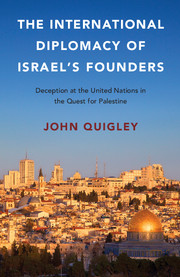 The International Diplomacy of Israel's Founders
The International Diplomacy of Israel's Founders Book contents
- Frontmatter
- Contents
- Preface
- A Note on United Nations Committees
- Abbreviations
- 1 A Public Relations Imperative
- 2 Promises, Promises
- 3 Pranks in Paris and Geneva
- 4 Courting the Commissar
- 5 Saving Europe's Jews – Our Way
- 6 Smoke and Mirrors at the YMCA
- 7 The Ship that Launched a Nation
- 8 Cocktails at the Consulate
- 9 Causing Chaos
- 10 Denying the Undeniable
- 11 A Peace-Loving State?
- 12 Joining the World with Fingers Crossed
- 13 Israel: 1, United Nations: 0
- 14 A Phantom Attack
- 15 Sabras in Sinai: Pardon My French
- 16 Suez Smoke-Screen
- 17 Mr. Nasser, Please Attack
- 18 Abba Eban's Finest Hour
- 19 Old Issues, New Lies
- 20 An Organization Turned Sinister
- 21 Prevarication Pays
- Notes
- Bibliography
- Index
8 - Cocktails at the Consulate
Published online by Cambridge University Press: 05 January 2016
- Frontmatter
- Contents
- Preface
- A Note on United Nations Committees
- Abbreviations
- 1 A Public Relations Imperative
- 2 Promises, Promises
- 3 Pranks in Paris and Geneva
- 4 Courting the Commissar
- 5 Saving Europe's Jews – Our Way
- 6 Smoke and Mirrors at the YMCA
- 7 The Ship that Launched a Nation
- 8 Cocktails at the Consulate
- 9 Causing Chaos
- 10 Denying the Undeniable
- 11 A Peace-Loving State?
- 12 Joining the World with Fingers Crossed
- 13 Israel: 1, United Nations: 0
- 14 A Phantom Attack
- 15 Sabras in Sinai: Pardon My French
- 16 Suez Smoke-Screen
- 17 Mr. Nasser, Please Attack
- 18 Abba Eban's Finest Hour
- 19 Old Issues, New Lies
- 20 An Organization Turned Sinister
- 21 Prevarication Pays
- Notes
- Bibliography
- Index
Summary
The Special Committee on Palestine submitted its report to the UN General Assembly on schedule, on September 1, 1947. The Jewish Agency was heartened by the outcome. It had lobbied for partition, and that was the recommendation of the Special Committee's majority. The Zionist General Council, a body functioning under the World Zionist Organization, adopted a resolution applauding the majority recommendation and denouncing the minority recommendation.
The Arab reaction was predictably negative. The Arab Higher Committee, as we saw, distanced itself from the Special Committee precisely because it sought a single state in Palestine and feared a recommendation aimed at dividing it. The Arab Higher Committee reacted to the Special Committee's report by calling for a one-day commercial strike for October 3 to “protest against the schemes and recommendation of the UNSCOP.” “The Arabs of Palestine,” declared the Arab Higher Committee, “refuse definitely to acquiesce in any solution entailing the partitioning of Palestine.” Arab businesses throughout Palestine shut their doors on October 3. Absent acceptance on the Arab side, any proposed solution for Palestine would be difficult to implement. As a result, the Special Committee report was not seen as providing a solution for Palestine. Rather, it was regarded as giving the Jewish Agency a base from which to work.
The General Assembly decided to have the Special Committee's report considered first by an ad hoc committee of the whole of the General Assembly. Called the Ad Hoc Committee on the Palestinian Question, this committee was to decide what to recommend to the General Assembly itself: whether to adopt the partition recommendation of the majority, whether to adopt the federal state recommendation of the minority, or whether to take some third approach.
AN “IGNORANT MAJORITY” IS UNDESERVING
The Ad Hoc Committee on the Palestinian Question held its first meeting on September 25, 1947. The effectiveness of the Jewish Agency's performance in Jerusalem was quick to reveal itself. Some individuals who had served on the Special Committee participated on behalf of their states. One was Jorge García-Granados, who represented Guatemala. García-Granados had supported the majority plan in the Special Committee. Not surprisingly, he spoke in favor of it. For García-Granados, it was unthinkable that the Jewish community would be part of a country in which the Arabs, as the numerical majority, might hold the keys to power.
- Type
- Chapter
- Information
- The International Diplomacy of Israel's FoundersDeception at the United Nations in the Quest for Palestine, pp. 72 - 80Publisher: Cambridge University PressPrint publication year: 2016


